 Petzlover
Petzlover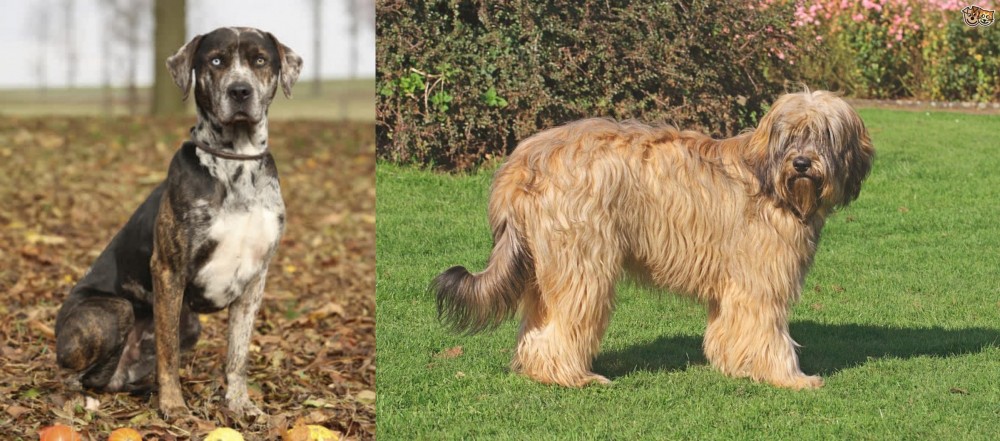 Catahoula Leopard is originated from United States but Catalan Sheepdog is originated from Spain. Catahoula Leopard may grow 13 cm / 6 inches higher than Catalan Sheepdog. Catahoula Leopard may weigh 23 kg / 51 pounds more than Catalan Sheepdog. Both Catahoula Leopard and Catalan Sheepdog has same life span. Catahoula Leopard may have more litter size than Catalan Sheepdog. Catahoula Leopard requires Low Maintenance. But Catalan Sheepdog requires Moderate Maintenance
Catahoula Leopard is originated from United States but Catalan Sheepdog is originated from Spain. Catahoula Leopard may grow 13 cm / 6 inches higher than Catalan Sheepdog. Catahoula Leopard may weigh 23 kg / 51 pounds more than Catalan Sheepdog. Both Catahoula Leopard and Catalan Sheepdog has same life span. Catahoula Leopard may have more litter size than Catalan Sheepdog. Catahoula Leopard requires Low Maintenance. But Catalan Sheepdog requires Moderate Maintenance
 This working dog breed originates from America’s Deep South. In fact it was originally named after a small village in the state of Louisiana and was made the state’s official dog in 1979. The dog is believed to have come from the Mastiff and Greyhound.
This working dog breed originates from America’s Deep South. In fact it was originally named after a small village in the state of Louisiana and was made the state’s official dog in 1979. The dog is believed to have come from the Mastiff and Greyhound.
Known as war dogs they were left with local tribes who crossed them with wolves, and French Beauceron blood was also included.
A number of Catahoula dog Associations were started and the Louisiana Catahoula Cur Association was formed in 1976, followed by others. These Associations work to promote the breed. In 1995 the United Kennel Club was the first national dog registry to recognize the Catahoula.
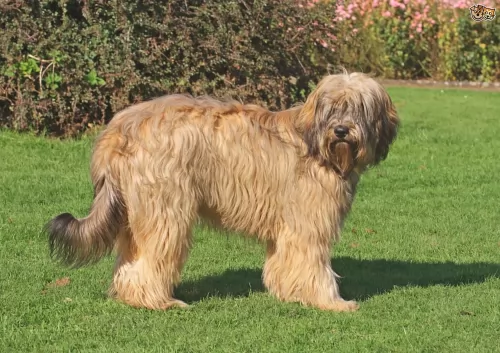 The Catalan Sheepdog, known also as the Gos d’Atura, hails from Catalonia, Spain. It is believed that the dog is related to the Portuguese- and Pyrenean Sheepdogs.
The Catalan Sheepdog, known also as the Gos d’Atura, hails from Catalonia, Spain. It is believed that the dog is related to the Portuguese- and Pyrenean Sheepdogs.
The standard for this breed was formulated in 1929. The sheepdog developed during Roman Empire times between 200 and 100 BC already, being used as livestock guard dogs. With the breed dwindling in the 1970s, Catalonian Sheepdog lovers started promoting it, but it remains a rare breed.
 Known as the Leopard dog because of the distinctive spotted patches on his short to medium length coat, this interesting looking spotted dog can have a coat of many colors such as solid colors, brindle and a blend of several colors including blue merle and red merle, black and tan.
Known as the Leopard dog because of the distinctive spotted patches on his short to medium length coat, this interesting looking spotted dog can have a coat of many colors such as solid colors, brindle and a blend of several colors including blue merle and red merle, black and tan.
He is a muscular and athletic dog of medium to large size with sturdy legs and deep chest. He stands at 56 – 68cm and weighs 20 – 50kg. Many of these dogs have webbing between the toes which gives them an advantage when running through marshy areas or when swimming.
With his floppy ears, the tail is long or bobtailed. An unusual aspect with the dog is his eyes – having what is known as marbled glass eyes which are blue or blueish-white in color.
The Catahoula Leopard Dog can be stubborn and he is also energetic, fearless and highly intelligent. You’ll want to have him trained and socialized early as then he becomes a more relaxed, obedient dog. He is an assertive dog but not aggressive by nature.
Catahoulas in general are even tempered and they are willing to share their space with children in the home as well as other pets. They are protective of children and of their entire human family, making good watchdogs.
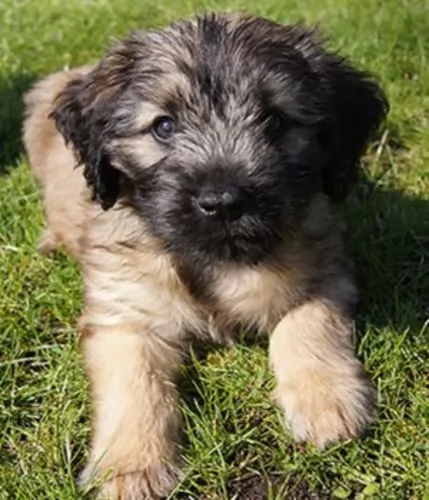 The Catalan is a medium sized dog but gives the impression of being bigger than he actually is. He stands from 45 – 55cm in height and weighs between 20 to 25kg.
The Catalan is a medium sized dog but gives the impression of being bigger than he actually is. He stands from 45 – 55cm in height and weighs between 20 to 25kg.
This breed also has double dew claws on the hind feet. He has a long coat which is slightly wavy and available in different shades such as fawn to brownish to dark grey to black. He has floppy, feathery ears and a fairly long, feathery tail. He has quite a bit of hair on he face too, so you’ll notice a beard, moustache as well as hair which covers the eyes somewhat.
Brave and courageous, the Catalan Sheepdog is also intelligent, active and hardy. He has a round face with a friendly, amicable expression. He is totally pleasant and sweet natured. However, in his role as guardian of sheep he took his role seriously, forming a strong relationship with both shepherd and sheep.
He is wary of strangers. Early socialization and training is always important, and while he makes a wonderful family pet, this training and socialization makes him more relaxed and obedient and he gets on well with children in the home as well as with other pets. While he is a placid, docile and gentle pet, he is also looked upon as a protector, and will defend his family.
 The Catahoula makes a fine family pet but he is a dog which shouldn’t be left outside day after day. He is a companion dog and won’t thrive without the companionship of his human family.
The Catahoula makes a fine family pet but he is a dog which shouldn’t be left outside day after day. He is a companion dog and won’t thrive without the companionship of his human family.
He is highly intelligent and also energetic, and if you want him to be relaxed and amicable around other humans and pets in the home he will require training and socialization. For training and ownership, the Catahoula Leopard will require a strong, firm, confident personality and he’ll be an obedient, loving and loyal companion.
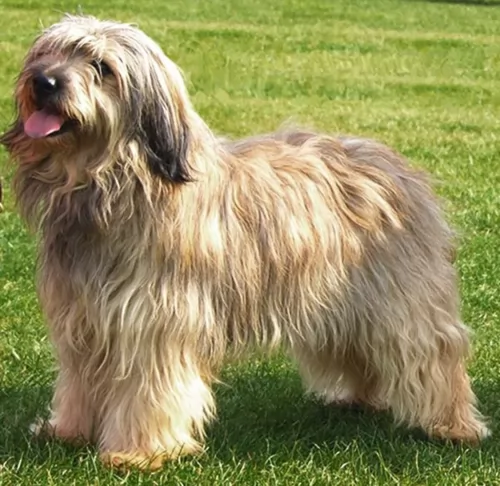 The Catalan Sheepdog is such an amicable character – he is going to make an awesome pet. He is an intelligent and obedient dog and is easily trained.
The Catalan Sheepdog is such an amicable character – he is going to make an awesome pet. He is an intelligent and obedient dog and is easily trained.
He has been used for guarding- and herding work and as a family pet makes a excellent guard dog as well. Capable of being gentle too, he is everything his human family wants him to be and just becomes a regular member of the family.
 Your Catahoula Leopard is a healthy dog breed and with good care he can live to be 10 to 14 years of age. However, there are a number of reasons why some of the healthiest dogs can become ill.
Your Catahoula Leopard is a healthy dog breed and with good care he can live to be 10 to 14 years of age. However, there are a number of reasons why some of the healthiest dogs can become ill.
Knowing about these illnesses means you can take action and minimize the pain and suffering your pet might have to otherwise endure.
You’ll notice your pet shaking his head and maybe even scratching his ears. Ear infections are more evident in dogs with floppy ears and there can be an ear discharge. When left untreated, the ears can become painful and then it is time to get him to the vet.
This is a common illness in dogs and can be terribly uncomfortable and debilitating for your pet as he tries to urinate all the time with no success. Signs of UTI can include this excessive urination with little urine coming out, lethargy and discomfort. Take your pet immediately to the vet to be checked over.
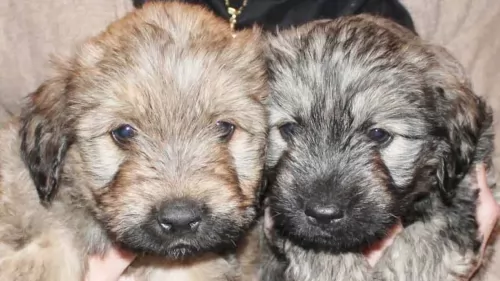 The Catalan Sheepdog is a fairly healthy breed and has a life expectancy of 12, 13 or 14 years. Nonetheless you will still need to watch out with common dog ailments with him, particularly hip dysplasia.
The Catalan Sheepdog is a fairly healthy breed and has a life expectancy of 12, 13 or 14 years. Nonetheless you will still need to watch out with common dog ailments with him, particularly hip dysplasia.
This is a joint and hip disease which can start with symptoms from 6 months of age already. Your dog will be hesitant to play and jump, doesn’t like to go upstairs, tires easily during a walk and develops a hop-like way to walk. You’ll notice that when he lies down, he battles to- or is reluctant to get up again.
X-rays may be required to confirm the diagnosis of hip dysplasia. There are different treatment options, all with the wellbeing of your pet in mind. You don’t want him to have a life of pain and lameness.
 A dog makes such a splendid pet, willing to give loyal and loving friendship to humans, even those who don’t treat him properly. When you think of the unconditional love your Catahoula Leopard dog will give you, surely you want to provide him with good food and shelter.
A dog makes such a splendid pet, willing to give loyal and loving friendship to humans, even those who don’t treat him properly. When you think of the unconditional love your Catahoula Leopard dog will give you, surely you want to provide him with good food and shelter.
It can be devastating if your dog goes missing, and if he has no identification, to find him might only mean telling people what he looks like. Rather put a collar on him and an ID tag so that your chances of getting him back are just that much better.
You can also have him micro-chipped by your veterinarian and these chips have a unique code which can provide useful information on your pet.
Make sure that your pet is vaccinated as a puppy against diseases which could be deadly such as rabies.
If you have no intention of allowing your Catahoula Leopard to have puppies, rather have him neutered or spayed if its a female. It is better for them and they can live longer and be free of some ailments that at un-spayed or un-neutered dog may get.
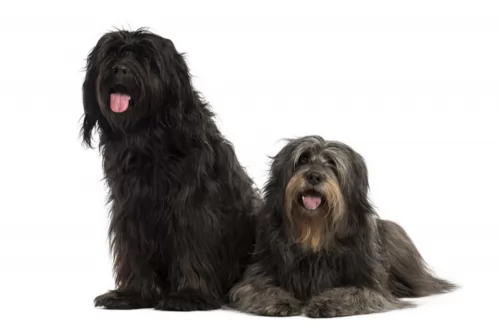 The Catalan Sheepdog is a working breed, so he is going to need plenty of exercise. While he adapts easily to city- or country life, it will be to his benefit to have a garden to romp in. You will still need to take him for walks and play ball- and rope games with him. This will prevent boredom and destructive behavior from him.
The Catalan Sheepdog is a working breed, so he is going to need plenty of exercise. While he adapts easily to city- or country life, it will be to his benefit to have a garden to romp in. You will still need to take him for walks and play ball- and rope games with him. This will prevent boredom and destructive behavior from him.
The Catalan Sheepdog has long hair so he will need to be brushed twice a week to avoid matting. This will help to remove loose hair too, but also distribute natural oils through his coat, keeping his hair and skin healthy and free from skin rashes and itchiness.
This brushing ensures other benefits as you can simultaneously check him for parasites such as fleas and ticks.
If you feed him commercial dog food, make sure its a high quality one. He is an active breed so will require high protein. Give him some homemade rice, vegetables and meat, and include raw meat in his food from time to time too. Always ensure that there is fresh, cool water constantly within reach.